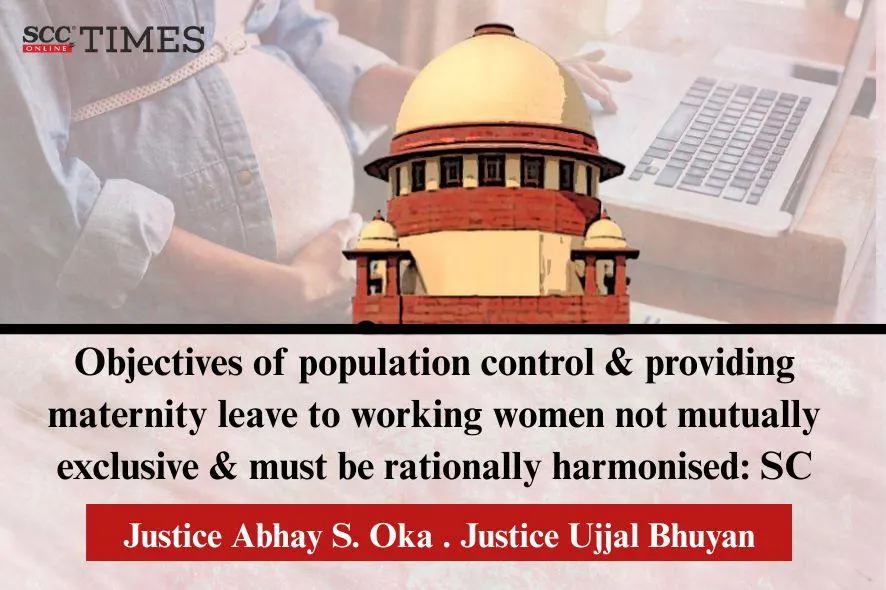Supreme Court: While considering the instant matter wherein the appellant who was denied maternity leave for a third child on account of her re-marriage, challenged the said rejection; the Division Bench of Abhay S. Oka and Ujjal Bhuyan*, JJ., held that the appellant was entitled to maternity leave. The Court explained that the appellant has two biological children out of her first wedlock; however, that was before entry into her service. Post her entry into service and from her subsisting marriage, this is her first child. Furthermore, the Court took note of the record that the two children out of her first wedlock were not residing with her but with their father, who had their custody.
The Court emphasised that State’s policy to limit population boom via population control is a laudable objective; however, so is the objective of granting maternity benefit to women employees. The object of having two child norm as part of the measures to control population growth in the country and the object of providing maternity benefit to women employees including maternity leave in circumstances such as in the present case are not mutually exclusive. The two must be harmonized in a purposive and rationale manner to achieve the social objective.
Background and Legal Trajectory:
The appellant had two children from her first marriage; one was born in 2007 and the other in 2011. She entered Government Service in December 2012 as English Teacher in Government Higher Secondary School, P. Gollapatti, Dharmapuri District in the State of Tamil Nadu. Meanwhile the marriage between the appellant and her first husband was dissolved in the year 2017. It was stated that the two children born out of this wedlock were in the custody of the former husband.
In 2018, the appellant remarried. Due to conceiving a child from her second marriage, appellant applied for grant of maternity leave to the authorities for the period from 17-08-2021 to 13-05-2022 (nine months) which was inclusive of both pre-and-post-natal periods. However, Respondent 3 vide order dated 28-08-2021 rejected the prayer of the appellant. It was stated that as per Fundamental Rule (FR) 101(a) which is applicable to state government employees of Tamil Nadu, maternity leave is available to women state government employees having less than two surviving children. There is no provision for grant of maternity leave for the third child on account of appellant’s remarriage.
Aggrieved by rejection of her request for grant of maternity leave, appellant preferred a writ petition before Madras High Court. The Single Judge Bench of the High Court held that the appellant was entitled to the grant of maternity leave, and the impugned order was set aside. Tamil Nadu government filed an intra-court appeal, and the Division Bench of the High Court reversed the single Judge Bench’s decision. The Division Bench had noted that insofar policy of the State is concerned it restricts benefit of maternity leave to two children. Therefore, appellant was not entitled to benefit of maternity leave for the third child. Grant of maternity leave is not a fundamental right. It is either a statutory right or a right which flows from the conditions of service. The Division Bench also applied the ratio of Deepika Singh v. Central Administrative Tribunal, (2023) 13 SCC 681, in favour of the State.
Aggrieved with the afore-stated decision, the appellant knocked the doors of the Supreme Court.
Contentions:
Counsel for the appellant argued that High Court’ Division Bench erred in holding that maternity benefit could not be provided to the appellant. Prior to her entry into service, she had begotten two children from her first marriage but their custody is with the father. Conceiving of a child out of her re-marriage which, in fact, is her first child from the new wedlock cannot be treated as her third child. The counsel also submitted that a likewise scenario was covered in Deepika Singh (supra). It was further contended that Right to have maternity leave is a facet of reproductive right of a woman which is traceable to Article 21 of the Constitution. Though the Maternity Benefit Act, 1961 may not be directly applicable to the state government employees, nonetheless for the purpose of adopting an approach which would further the legislative intent, certainly guidance can be derived from the provisions of the Maternity Benefit Act, 1961.
Per contra, the respondents argued that maternity leave policy is subject to fiscal responsibility and human resources management. Any deviation from the established policy of not extending the benefit of maternity leave to women employees having more than two children would create precedents that could potentially overwhelm the exchequer and impact administrative efficacy. If the reliefs sought for by the appellant is granted, it would amount to incentivizing breach of population control norms and may have severe and adverse impact on government’s policy of managing small family norms as a population control measure. Furthermore, provisions of the Maternity Benefit Act are not applicable to state government employees like the appellant. However, benefits extended to government employees of Tamil Nadu as social welfare measures are more beneficial than under the Maternity Benefit Act.
Court’s Assessment:
Perusing the order denying leave to the appellant and the impugned decision of the Division Bench, the Court said that same needs to be examined in the backdrop of constitutional and statutory framework and international developments.
Article 21 of the Constitution though at first blush appears to be a colourless article; it is a potent provision pregnant with wide width and scope having received extensive and liberal construction at the hands of this Court. By judicial interpretation, it has been held that life under Article 21 means life in its fullest sense; all that which makes life more meaningful, worth living like a human being. Right to life includes all the finer graces of human civilization, thus rendering this fundamental right a repository of various human rights. Right to life also includes the right to health. Right to live with human dignity and the right to privacy are now acknowledged facets of Article 21.
Article 42 of the Constitution which is one of the directive principles of State policy mandates that the State shall make provisions for securing just and humane conditions of work and for maternity relief. Article 51 of the Constitution states that through Article 51(c) that the State shall endeavour to foster respect for international law and treaty obligations in the dealings of organized people with one another.
Referring to Fundamental Rule (FR) 101(a) for Tamil Nadu government servants, the Court pointed out that as per the first proviso to clause (ii) of FR 101(a), maternity leave referred to clauses (i) or (ii) shall be granted to a married woman Government servant with less than two surviving children. The second proviso says that in the case of a woman Government servant with two surviving children born as twins in the first delivery, maternity leave shall be granted for one more delivery. Though provisions of the Maternity Benefit Act per se are not applicable to the State Government employees, nonetheless, the Court referred to Section 5 of the Act. The Court said that that grant of maternity benefit is per se not denied to a woman employee having more than two children. Following amendment in the year 2017, a restriction has been introduced in Section 5 by inserting a proviso under sub-section (3) as to the entitlement of the period of maternity leave. A woman employee having less than two surviving children is entitled to a maximum period of benefit i.e. 26 weeks and for a woman employee having two or more than two surviving children, the benefit is restricted to 12 weeks. Thus, there is no ceiling or cap on the number of children to claim maternity benefit. Only thing is that in case of a woman employee having two or more than two surviving children seeking maternity leave, period of the benefit is reduced: from a maximum period of 26 weeks to a maximum of 12 weeks.
Section 27 of the Maternity Benefit Act deals with effect of laws and agreements inconsistent with the Maternity Benefit Act and declares that provisions of the Maternity Benefit Act shall have effect notwithstanding anything inconsistent therewith contained in any other law or in terms of any award, agreement or contract of service, whether made before or after the coming into force of the Maternity Benefit Act.
Considering the international treaties and conventions such as Universal Declaration of Human Rights, International Covenant on Economic, Social and Cultural Rights, Convention on the Elimination of All Forms of Discrimination Against Women (CEDAW) and Maternity Protection Convention under the aegis of International Labour Organization; the Court pointed out that the world community has recognized the broad spectrum of reproductive rights which includes maternity benefits. Maternity leave is integral to maternity benefits. Reproductive rights are now recognized as part of several intersecting domains of international human rights law viz. the right to health, right to privacy, right to equality and non-discrimination and the right to dignity.
The Court also pointed out that international recognition and maternity benefits and expansion of its contours affected Indian law. The Court referred to X v. Principal Secretary, Health and Family Welfare Department, (2023) 9 SCC 433, wherein it was observed that the ambit of reproductive rights is not restricted to the right of women to have or not to have children. It also includes the constellation of freedoms and entitlements that enable a woman to decide freely on all matters relating to her sexual and reproductive health.
Coming on to the case of Deepika Singh (supra), where the appellant therein had her request for grant of maternity leave rejected as the authorities concerned considered the two children born from the first marriage of her spouse and her first biological child was considered as the third child. The Supreme Court in Deepika Singh (supra) had opined that Rule 43 of the Central Services (Leave) Rules, 1972 must be imbued with a purposive construction. Since it is a beneficial legislation, it has to be construed with a purpose-oriented approach and must receive a liberal construction to promote its objects. Thus, the Court was categorical in declaring that the factum of appellant’s spouse having two biological children from his first marriage would not impinge upon the entitlement of the appellant to avail maternity leave for her sole biological child. It was held therein that grant of childcare leave to the appellant for the two children of her spouse from his previous marriage could not be used to disentitle her to maternity leave under Rule 43 of the 1972 Rules. In the context of employment, childbirth must be construed as a natural incident of life and, hence, provisions for maternity leave must be construed in that perspective.
Decision:
With the afore-stated assessment, the Court deemed it fit to set aside the decision of Madras High Court’s Division Bench and held that the appellant shall be granted maternity leave under FR 101(a). Maternity benefits which are admissible to the appellant shall be released to her within a period of two months.
CASE DETAILS
|
Citation: Appellants : Respondents : |
Advocates who appeared in this case For Appellant(s): For Respondent(s): |
CORAM :





